Getting a chicken coop ready for winter isn't as big a deal as you think. For instance 99% of the time your coop isn't going to need a heater. With some insulation, good ventilation and a windbreak your chickens will be comfortable even through a Canadian winter.
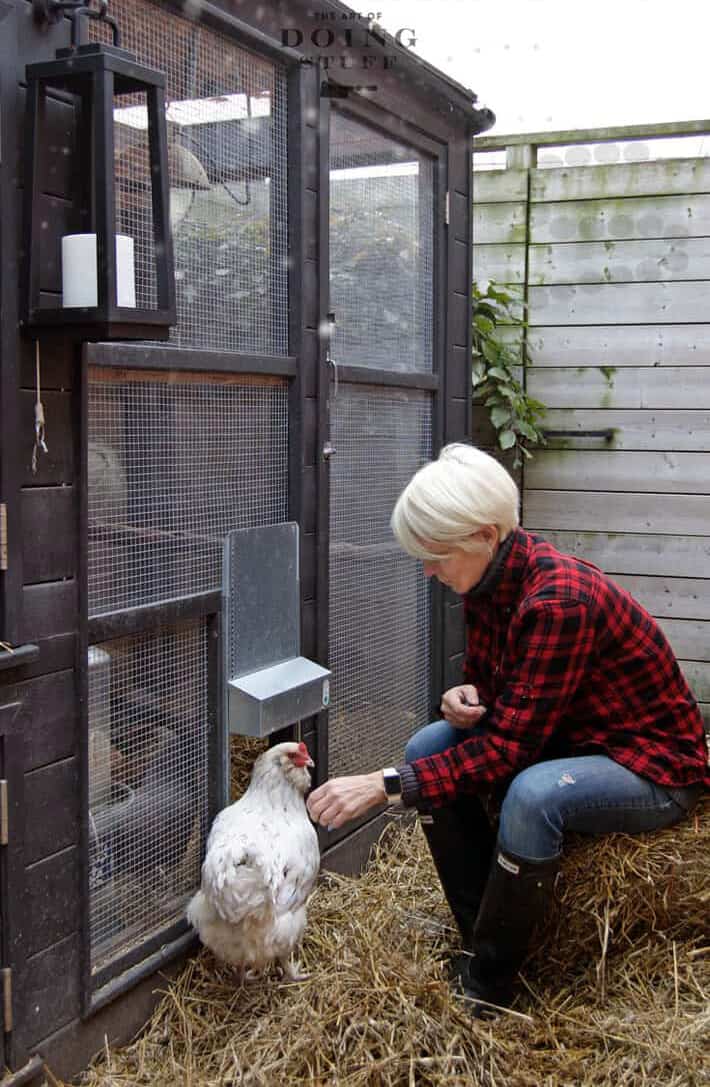
Notice the automatic coop door? It is one of the BEST accessories you can equip your coop with.
Read my post on how to install an automatic coop door and which one I use.
You may be thinking to yourself, Hey, I don't own chickens so I don't need to winterize a chicken coop. And you would be right. Feel free to skip this post and instead read about how cheese was invented and how to make your own cheese serving board. I will wonder about your judgement if you do skip this post, but truth be told, I was already wondering about you.
For those of you who haven't been around since the beginning of my foray into chickens, I should explain how I got chickens in the first place. My former fella, an imposing man stretching 6'4" into the sky, with a tattooed neck and size 13 feet, came home one Easter morning cradling a small cardboard box filled with straw and 6 downy little chicks.
I'd always said I wanted chickens, but I said it the same way one says they want to be taller, or try kickboxing. They're fantasy ideas that are nice to ponder but have no basis in reality.
the original chicks.
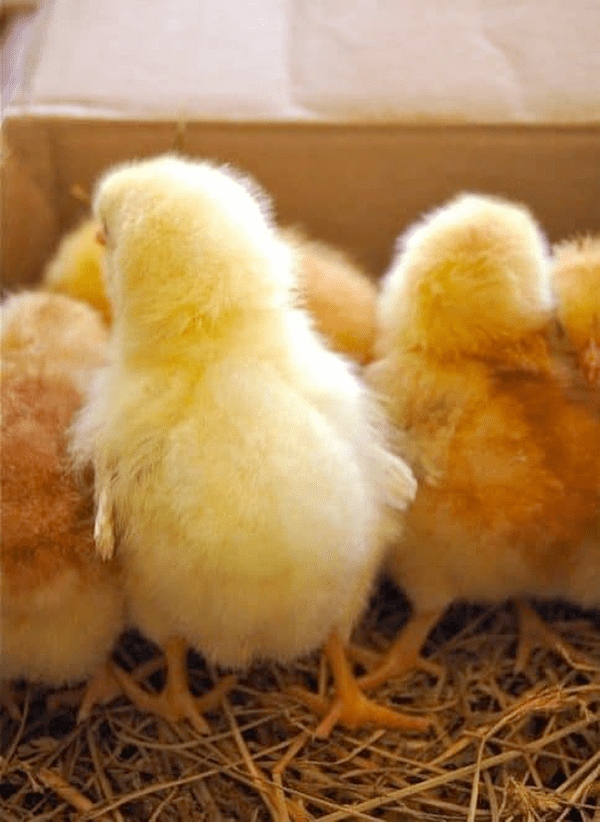
Home he came with the box of chicks, plunked them on the counter and smiled at me, clearly thinking I'd instinctively know what to do with a cardboard box full of livestock. I did not. In the next few months I read everything I could about raising chickens in between building a chicken coop and keeping my mouth shut about how much fun I think it would be to own goats.
I've had many years of learning about chickens now with the most valuable information coming from experience, not books, the Internet or word of mouth. One of the things I was most scared of that first year was winter.
Now in my 13th year of owning chickens I no longer worry that they'll freeze to death.
I was terrified the chickens would be cold. I mean how could they not be? I hadn't considered the fact that chickens are covered in feathers and down and all the other birds in the wild seem to manage to survive without me running out with heaters and sweaters for them.
The truth is, the heat of summer is far more dangerous to your chickens than cold. Having said that, there are still a few things you need to do to get your coop ready for winter if you live in a colder climate.
Table of Contents
How to Winterize a Chicken Coop
- Clean out the entire coop. This is especially important if you use the deep litter method like I do. Scrape the ladders, walls and floor of any caked on poop. At this moment, those of you who don't own chickens but decided to read this post anyway are now saying "See? This is exactly why I don't want chickens".
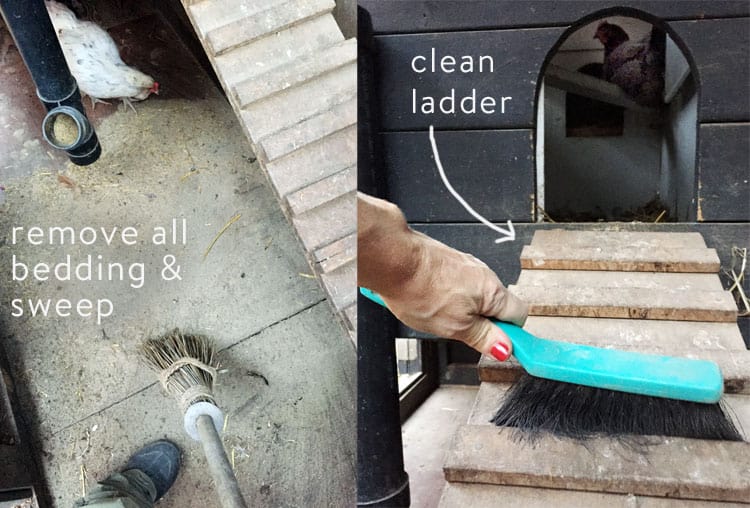
2. Add in an extra-thick layer of bedding. I use straw because each individual piece of straw is filled with air which acts as great insulation. I start with at least 6" of bedding in the run and 8" in the roosting area at the beginning of the winter season.
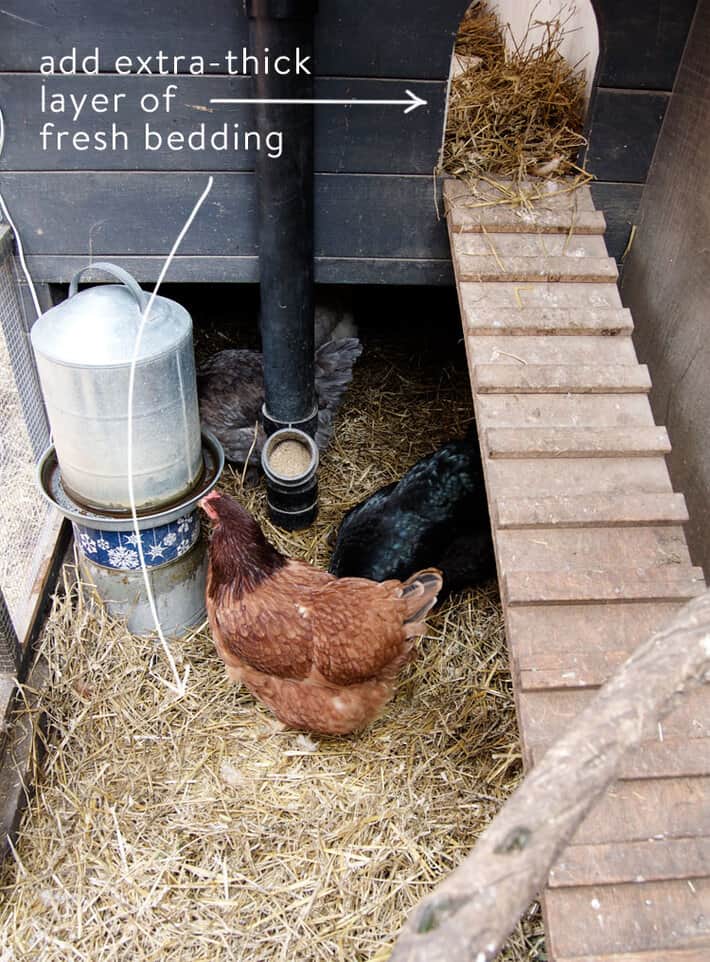
3. Block out the wind and snow if you have an open run like I do. Half of my coop is made of hardware cloth which doesn't provide much of a barrier in the middle of a raging winter blizzard. For the first few years I tacked up plastic sheeting like this to block the wind and snow, but then invested in plexiglass. I had pieces cut to size to fit in each of the coop openings that needed to be filled.
If you do either of these things make sure you leave adequate ventilation at the top of the coop. Ventilation is very VERY important. In fact, a poorly ventilated coop will also kill your chickens more quickly than the cold will. Without adequate ventilation the coop will become humid which can cause frostbite in cold weather plus the air will be toxic with ammonia from all the poop. So ventilate. Got it?
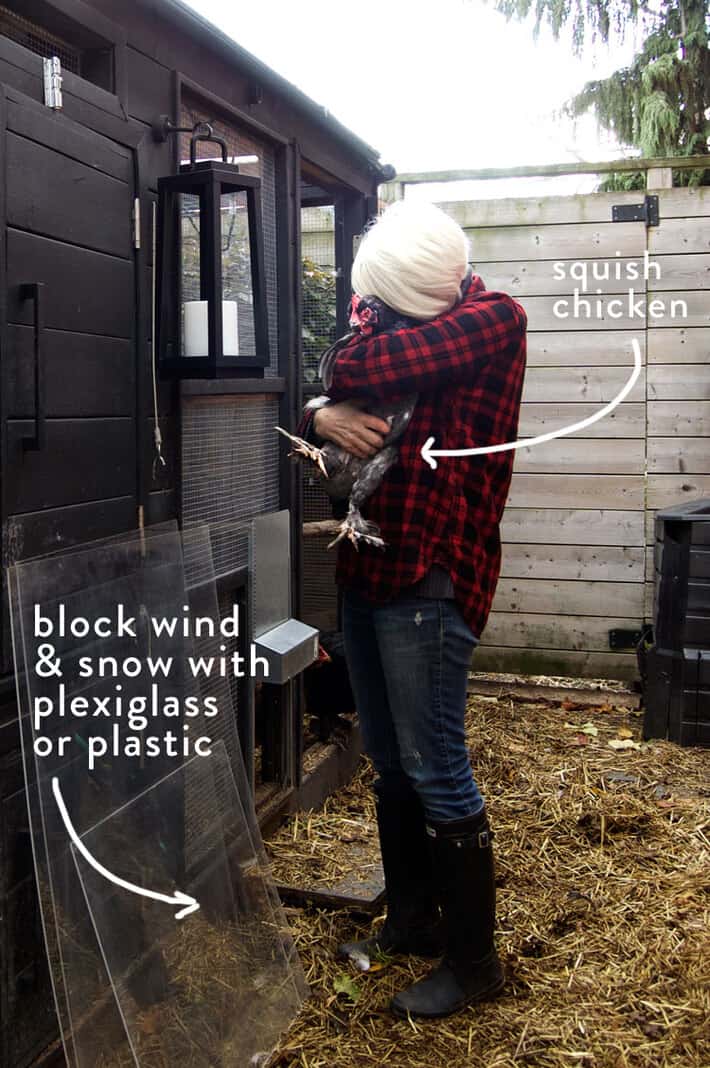
That's Mabel. She's 9 years old now. She still doesn't like being squished.
4. Keep your water thawed. You can buy a variety of different heated water systems for your coop to keep it from freezing all winter, but the most economical way is to DIY your own. You can either add small outdoor Christmas lights or install an actual low watt bulb into a metal cookie tin. If you're in a pinch and don't have a metal cookie tin handy, you can go the even easier route using this method. I have a whole tutorial on installing the lightbulb in the cookie tin here. Set your regular metal waterer on top and the heat from the lights is enough to keep the water from freezing.
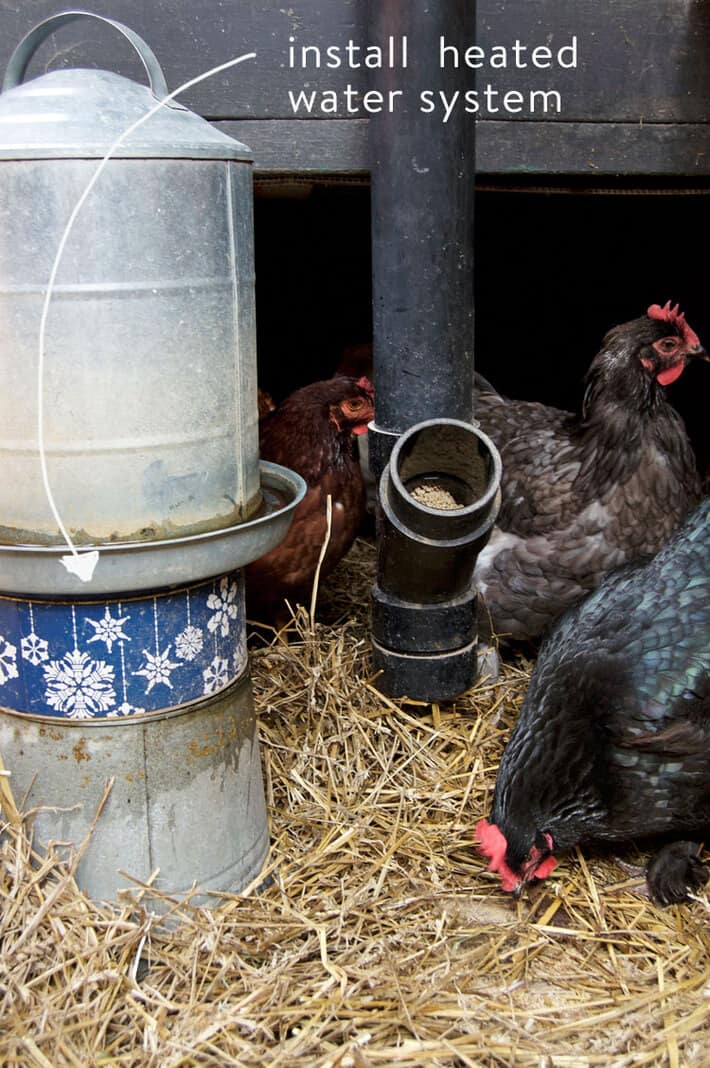
5. Put your lights on a timer if you want your hens to lay in the winter. A chicken is triggered into laying eggs by the length of the day. They need 14-16 hours of light to regularly lay eggs. Anything under that (like the 9 or 10 hours we typically get in winter) and they will spend all those extra hours sleeping as opposed to egg laying.
Supplemental lighting is a bit controversial with some owners preferring their hens follow the course of nature by getting the winter months off of laying. If you do choose to use a light to help with continued laying set it to come on prior to dawn. If dawn is 8 a.m. and dusk is 6 p.m. (10 hours) you need to set your timer to come on at 4 a.m. to get regular egg production.
I don't do this during the shortest days of winter, allowing the chickens to rest. I do however use supplemental lighting in the fall and spring.
6. Heat the coop? That's another controversial subject among chicken owners. I was convinced that chickens needed to be toasty warm when I first got my birds, but quickly realized that heat wasn't going to make the hens more comfortable, it was going to make ME more comfortable.
Chickens are covered in feathers. They're fine in the cold. Don't fret it. Keep the wind and snow out of their coop and they'll be fine. I *do* have a safe, ceramic, wall mount heater in my coop for nights that get exceedingly cold to prevent frostbite on any areas of the chicken that aren't covered in feathers like their feet, combs and wattles.
Last year I didn't turn it on at all.
Any nights that will be below 4 Fahrenheit or -15 Celsius, I will turn the heater on to raise the temperature by a just a few degrees.
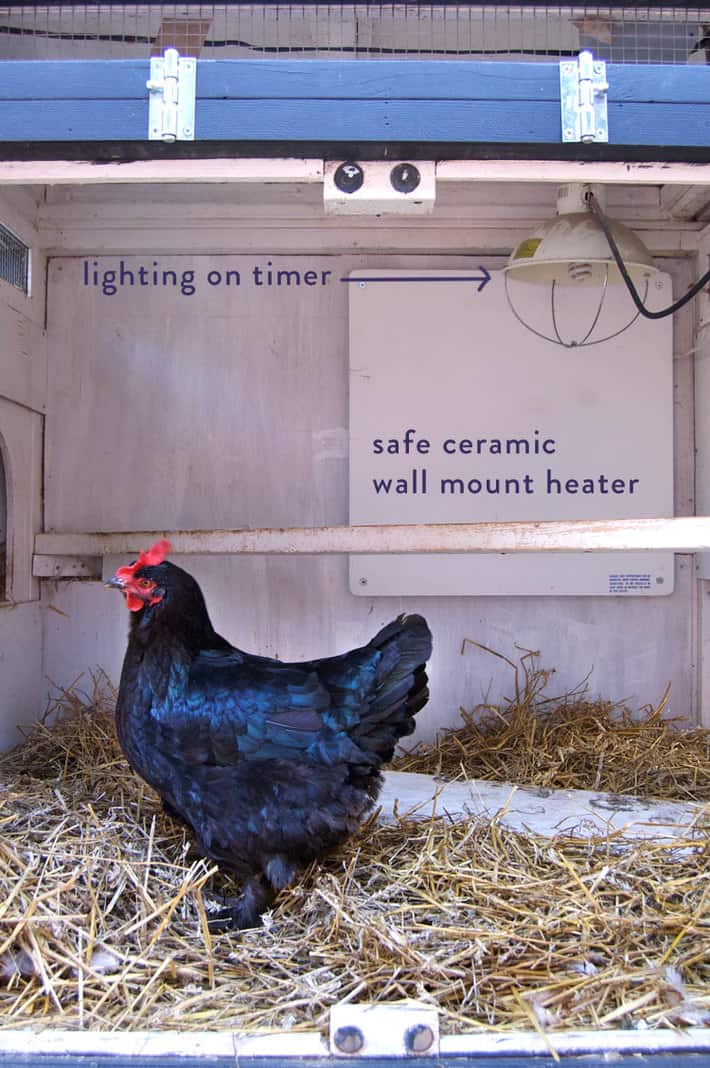
7. Insulate the coop.
Insulating your coop is a smart idea. I have placed styrofoam insulation between the studs of the ceiling of my coop to help hold heat in at the top.
Straw also acts as a great insulator, and using it on the floors will insulate the coop from the cold ground.
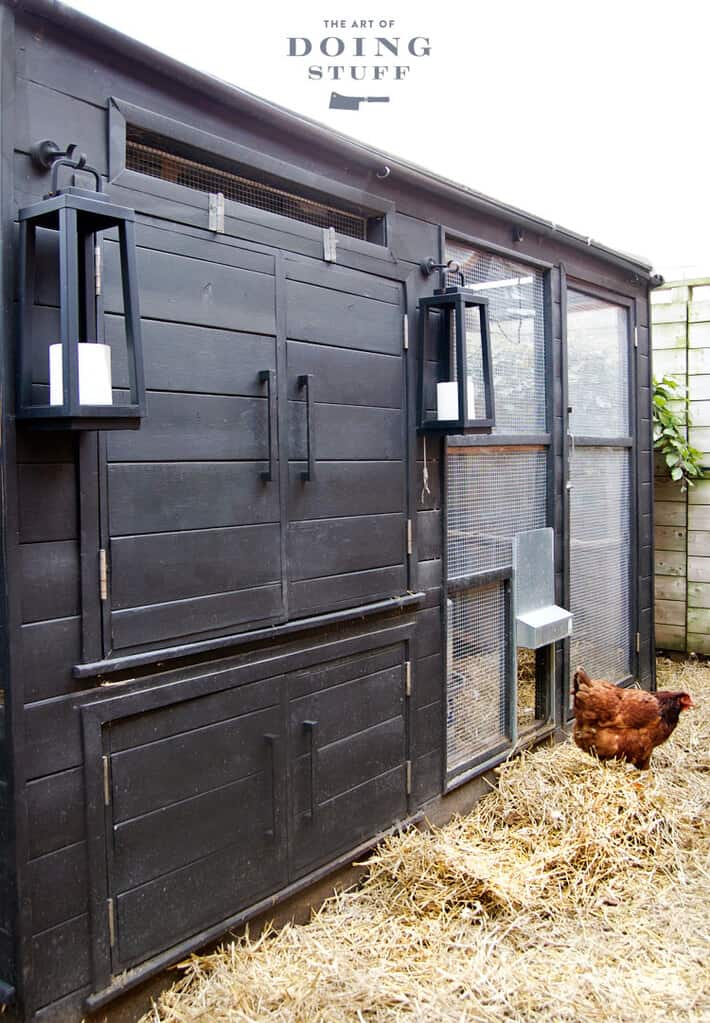
8. Number of chickens per square foot
The MOST important part of keeping chickens in winter is the number of chickens you have per square foot. More chickens = more heat = more moisture. If the balance is off between your chickens and square footage, the coop will either be colder than you want, or higher in humidity than you want. (a lot of chickens in a small space means they're giving off a lot of moisture with breath and poop. The high humidity in turn makes the chickens colder, more prone to frostbite and susceptible to respiratory distress.

Winterizing the flock
Now that the coop is ready for winter you need to winterize your hens.
Shorter days prompt moulting in chickens, where the hens lose their feathers and grow new ones. They do this to make sure they have their own natural layer of insulation that's in perfect condition for the winter. Moulting takes a lot of energy from your girls, so any extra energy they have goes into moulting as opposed to laying eggs.
To winterize your flock make sure they get extra scratch before bed to help keep them warm throughout the night.
Shorter days also trigger your hen to stop laying eggs so they can use their extra energy in the winter for keeping warm and resting up.
How to get chickens to lay in the winter.
Chickens naturally stop or slow down with their laying through fall and winter. They don't make the decision to do this, it's a natural process that begins when the days start to get shorter.
To help prompt your hens to lay throughout the winter there are 3 things you can do:
- Install lighting in your coop. (Hens need a minimum of 14 hours of light a day to lay eggs)
- Add *minimal* heating. (If hens are busy using their energy to keep warm they won't have enough left over to lay eggs)
- Feed extra scratch before bed. (Extra fatty feed gives them the energy to keep warm & well rested)
How many square feet do you need per chicken?
4 square feet per 1 chicken (inside of coop)
So for a coop area that is 6x6 the ideal number of hens is 9. (6x6 = 36 square feet of space. 36 sq. feet of space / 4 sq. feet of space needed per chicken = 9)
If you do all these things you can feel confident that your chickens will make it through the winter comfortably. I wonder what kind of care goats need in the winter?
And would they like kickboxing?
→Follow me on Instagram where I often make a fool of myself←
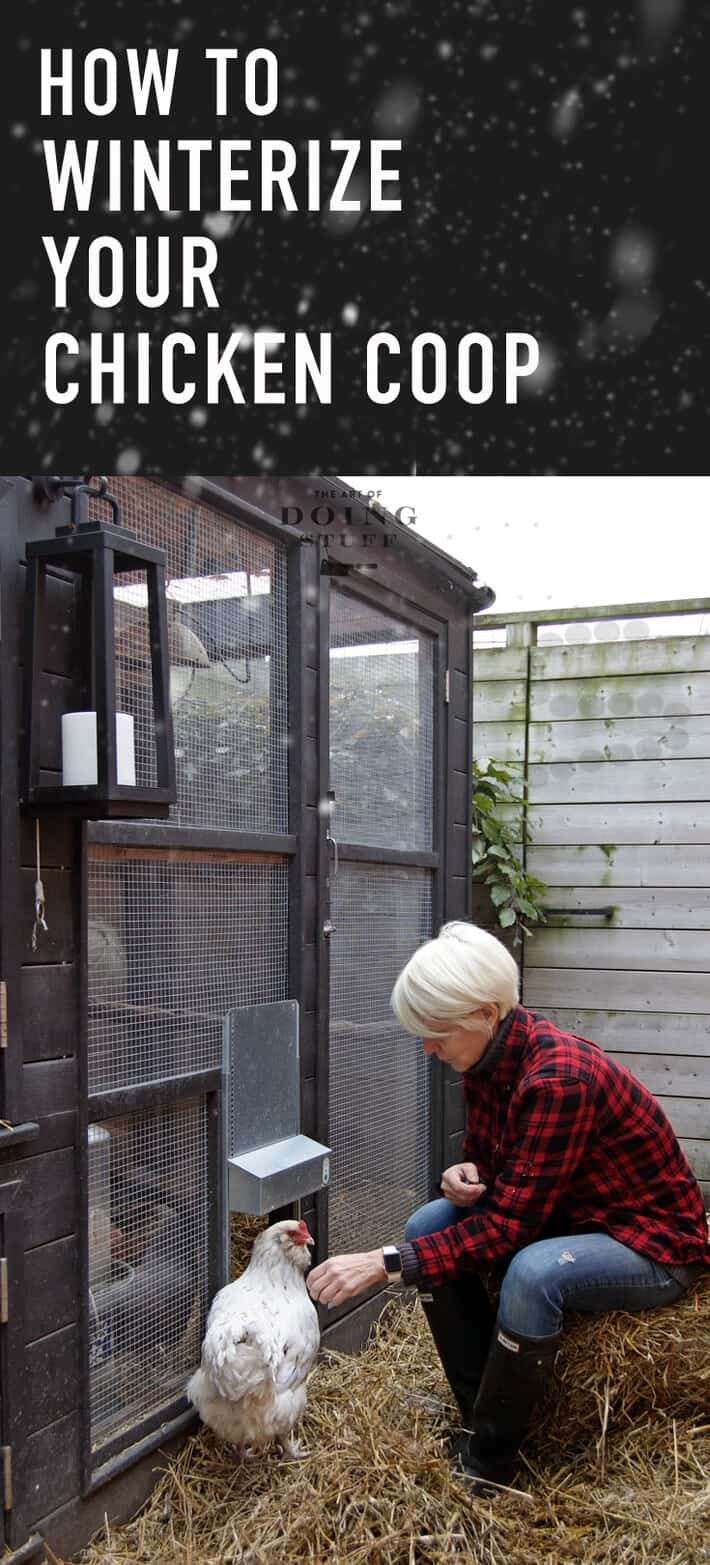


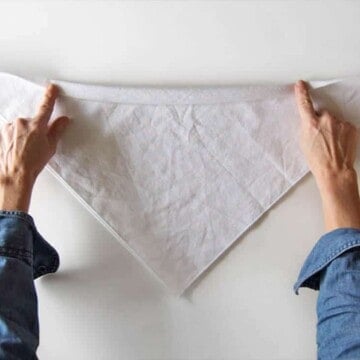
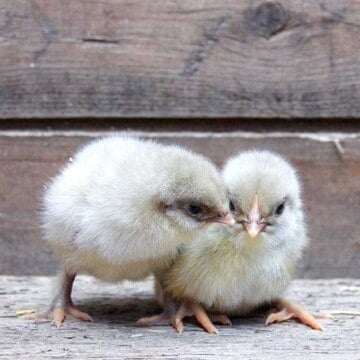
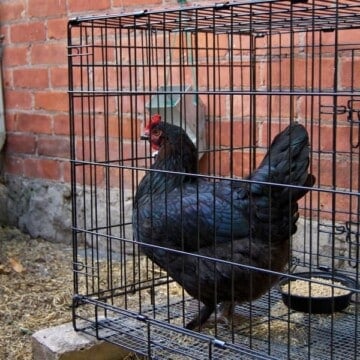
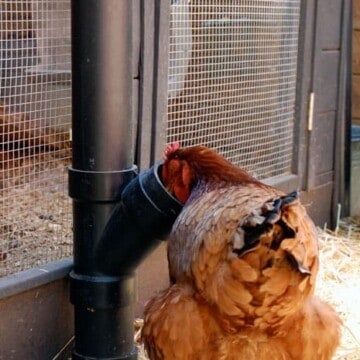
I must have missed the kind of automatic door for the chickens. We had to move from Montana and of course leave my wonderful coop. I had a good automatic door but I don't remember what brand it was. So I would like to know what you use. Thank you, Rae Sandberg
Hi Rae. The coop door I have is from Adorstore. I have what was probably the first, original version. It's been perfect since day 1. ~ karen!
Thanks so much for the great article. I have one question that I'm sure is obvious, but never seems to make sense to me. How do you insulate your coop and still have openings for ventilation? I'm assuming you just insulate everything EXCEPT the vent areas and that somehow the heat still says in even though cold air may be coming from the ventilation areas on top? If it's minus zero, should you be covering the ventilation areas or just still leave this open? I am not sure how the chemistry of heating works here. Thank you.
Hi Alzara. More than anything the chickens themselves heat the coop while they roost at night. :) The insulation helps to keep their heat in. Ventilation is more important than heat because it allows moisture to escape the coop. I really don't want you to worry about heating. Chickens don't really need heat to be comfortable. So the insulation just helps keep things like their combs and wattles from getting frostbite. I personally. have just insulated the back wall and the roof of the coop. ~ karen!
i dont have chickens, but i enjoy your posts about raising them! i also am able to have full on conversations with people who have them, and have actually given them advice based on what i learned from you! Lol.
I kept chickens a long time ago (before moving on a boat and other life-changing events) and I just want to say your advice is PURE GOLD.
Having and caring for domestic and companion animals is a beautiful (dare I say, spiritual) thing.
I don't live on a boat now and though I miss having critters around I am realistic about my space and energy level to know that it's not likely to happen beyond an indoor kittycat.
Golly, the memory of keeping goats is very near bliss. Can't explain why exactly but the aroma of clean bedding straw is heartwarming. Yah, sorry, I know that's weird.
That's not weird, everyone love the smell of fresh straw! I think. Don't they?? ~ karen!
Goats are pretty good at taking care of themselves in the winter, or any time, but- beware- they have all day to figure out how to open things, get at tasty things, and generally run amok, and you have only so many hours in a day to ensure that they are not somewhere they shouldn't be, doing something you don't want them to be doing. Be careful what you wish for. ( but they do have personality!)
I do not have chickens but I read this article from start to finish. I learned quite a few things. Lucky chickens to have you as a mom.
Goats YES I say! We started with chickens in our suburban backyard in 2020. I love them. Many of them love to be cuddled. Then... if eggs, why not milk. We adopted 2 Nigerian Dwarf doelings at 8 days old. Bottle fed them, bred them last year, had babies this May. The babies have gone on to their forever homes (they can be weaned at 2 months and 20lbs) and now we have milk! Just the right amount for the two of us. I make cheese twice a week, yogurt, ice cream and just a glass of milk. HEAVEN! Their pen is 10x40ft and we walk them in the neighborhood every day. We've met sooo many more of our neighbors (having lived here 20+ years) since we started walking the goats. Neighbors bring us their prunings from their trees for the goats! These girls are so personable and delightful and smart! I love them too. Pets with benefits... The chickens turn my compost pile and the goat manure can go directly into the garden. Any 'spent' hay is my mulch layer. THIS is the LIFE!
I count on two IMPORTANT events as the days grow shorter and the climate gets colder. #1 of course is our dopey time change which occurs this Sunday. and #2 is your joyous post on chicken wintering. I toletrate the first and delight in the second.
Randy,
I always look forward to your comments. I agree with you on the time change stupidity. I’ve never met anyone who likes or appreciates it. It isn’t necessary and I detest having to change the digital clocks. Losing or gaining an hour, rinse, repeat. Throws a wrench into the system. Ugh.
Cher’s first release- Ringo I Love You.
IMG_4428
I don't have easy access to electricity to my coop. Also afraid of fire because we live in an old house with older wiring. Any ideas for keeping water from freezing?
I'm sure you could find solar powered Christmas lights. I've used them in my garden before.
Hi Karen
I don't have chickens but was worried that I was one of your followers you have doubts about so read entire wintering story plus other chicken related info. Please never doubt me again. Should you take up goat wrangling I will be equally on board. Also to say that your humour arrives fully intact here in the UK losing not a single snicker, chuckle or guffaw over the Atlantic.
hi Karen-
I'm trying to use the automatic chicken door link but it redirects to this page...wonder if you could let me know what you use?
Wonderful post, as always! If you have a chance, Clarkson’s Farm is excellent and hilarious and his “voice” is much like yours, happy and witty. Happy November!
I thought I might be the only weirdo to delight in Jeremy Clarkson and his farm antics. I cringed so many times watching him make excruciatingly poor choices but delight in the resolutions.
No, I don't keep chickens here in Chicago, other than the prepackaged parts of them I get from the grocery store. And those I keep in a small 7cu ft chest freezer along with various other well wrapped or vac sealed segments of various edible creatures.
But I do find you to be a sheer delight in spirit and kindred humor (or humour if you prefer in your Canadian ways). I hope things in the land of new dog are progressing progressively and you've not been driven nutz by the big beastie.
luv ya'.
Hi there, I just came upon your site while trying to find a good insulator and/or bedding for some chickens in a quick hurry. See the neighbors chickens keep coming over to my yard, which is fine, we were wanting to get some chicks and build a coop anyways, but they don't belong to us, but still keep coming over and sleeping underneath our steps at night. We recently had some bad storms and water has collected where they've decided to sleep at night. So for the meantime, until their coop is built I have an old ammo box for them to sleep in and to keep dry. I could go in the daytime to the co-op store for hay ,but what can I use in emergencies for them to have bedding on bottom?( The water is probably about 4 to 5 inches high.) Also, is this normal for chickens to leave their normal coops and stay well away from home? What I mean is, is it normal for them to leave their nest or do I need to possibly alert authorities and have them check for their safety?
Hi Dara. Regular bedding materials are sand, straw, hay or pine shavings. I'm not exactly sure how old these chicks are, but I assume they're young if they can fit in a ammo box. Or there aren't too many of them. I wouldn't go heading to the authorities but would probably just go over to the neighbours and tell them about the situation. You're right, they aren't your chickens so you can't really just take them. What's probably happened is the neighbours don't know the chickens aren't returning home at night. It could be that they have an automatic door that's shutting earlier than the chicks can get back in. Or they could have a predator that's scaring the chicks away at bedtime. It could be that they just don't have a coop. In which case, you still can't call animal control because having a coop for your chickens isn't the law, it's just common sense if you care about the safety of your chickens. :/ Tremendously long story, even longer - don't worry about their bedding for tonight, it's actually probably more important to protect them from predators than from the rain. Talk to the neighbours tomorrow (or leave them a note w/ your cell phone #) and then go from there. :) ~ karen!
Those look like some happy chickens---well, except for the one being squished.
Hi Karen! I love your chicken coop post. One of my favorite photos we have is the one of my late mother-in-law at age three with a big grin as she squished her pet chicken! I had chickens once, but my stupid ex-husband thought it was fun to run up to the coop and scream at the chickens just to see their reactions. He was an idiot - hence the ex! Needless to say we didn't get many eggs. Also, my youngest daughter STILL hasn't forgiven me for making her feed the chickens and that was 37 years ago!! She hated them. I bought two fake chickens and a rooster to put in the yard when she visited last summer. She refused to go out side for some reason, LOL. I'm still trying to convince my good husband (third times the charm!!) to let me have chickens...
Hi Karen,
I've read that it's good to put petroleum jelly on chickens' combs and wattles to prevent frostbite, and I think this is especially important for me because one of my overzealous hens basically dunks her whole head in the water when she drinks. Have you done this before? If so, how much do you use and how often do you have to reapply?
Thanks!
Those ceramic heaters are quite intriguing. The first time I saw on was on a HGTV's "Unsellable Houses". From what i understand their quite energy efficient and seems to be unobtrusive if the wall is painted a similar color. I could see quite a few different places these could be used and they seem much safer than portable space heaters.
Hi Karen, I am 14 and got 4 hens for Easter over quarantine, we are making a second coup for winter this weekend because it often gets below -20 degrees Fahrenheit in South Dakota. I could really use some advice on what would be best for them. If you could help, it would be much appreciated because the last time we had chickens, I was 8, and they all died. Three were eaten by a fox, the fourth one froze under a heat lamp.
Hi Lucee! Do you know what kind of chickens you have? Some breeds do better in the cold and don't need as much extra stuff in the winter. Make sure the coop is draft-free, well-ventilated, and very secure from predators. This guide is really great, and you can also check out sites like backyardchickens.com, which has message boards that might be helpful (either to ask a question or read answers to things people have already asked).
Hi Karen, I am 14 and got 4 hens for Easter over quarantine, we are making a second coup for winter this weekend because it often gets below -20 degrees Fahrenheit in South Dacota. I could really use some advice on what would be best for them. If you could help, it would be much appreciated because the last time we had chickens, I was 8, and they all died. Three were eaten by a fox, the fourth one froze under a heat lamp.